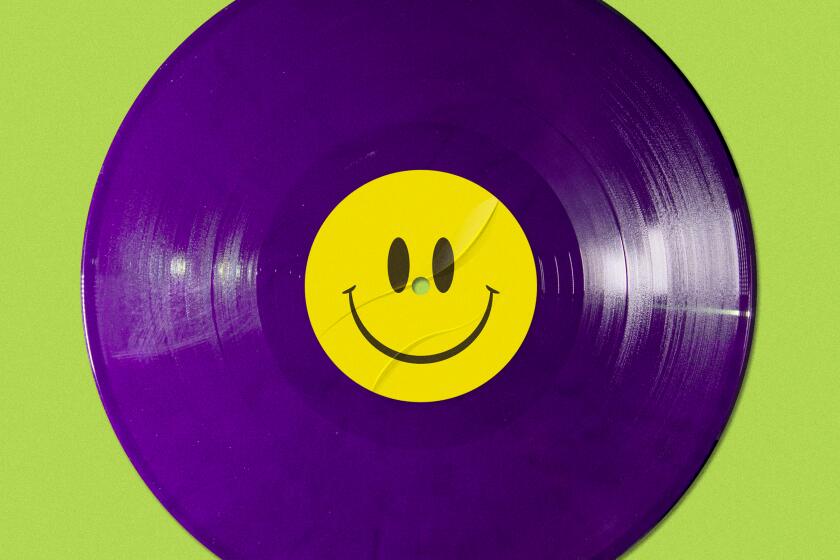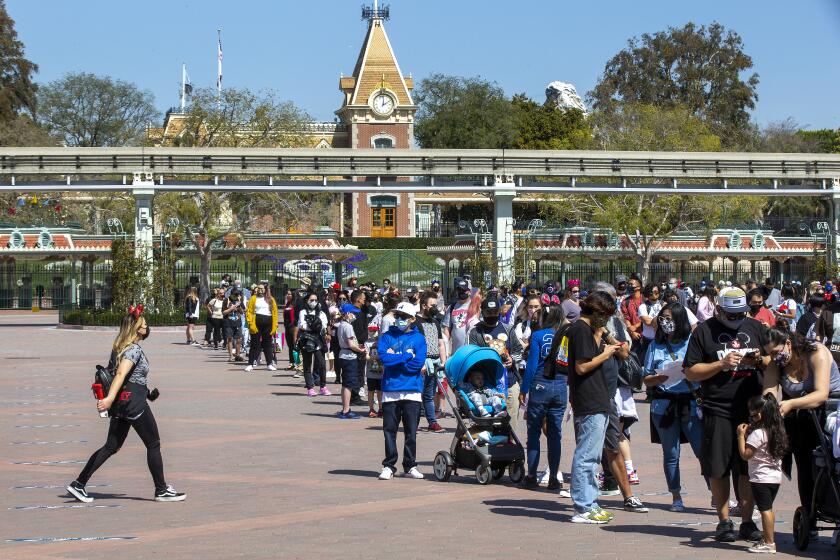Trailer Chic
Across from the gated entrance to Paradise Cove, a private beach in Malibu, there sits a silver Airstream mobile home that catches the sunlight and reflects it right up the bluff to the spindly green and silver trees overlooking the ocean. The Airstream is perhaps 15 feet long and sealed up as tight as an unopened pack of cigarettes.
Standing across from it, I thought of my Southern childhood and the mobile homes my cousins would stream out of like so many circus clowns escaping impossibly small compartments.
“Keep your shoes on,” Mama would tell my sisters and me when we visited one of our aunts in the trailer park. “And, no, you can’t sleep over.” Then she would turn to embrace her sister, knowing that soon enough we would be running barefoot with our cousins and begging to spend the weekend--and now and then she would relent and let us stay.
What Mama scorned, we admired. We envied our cousins, and dreamed of living in a home on wheels where nothing had to be packed up when you got the notion to move. There was the charm of sleeping in box beds stacked three high in the narrow space between the kitchen/living area and the tiny “master” bedroom at the back. There were clever little net shelves in the corners where flashlights or treasures could be tucked.
Drawers on the bottom held clothes and toys, and dried out peanut-butter sandwiches that could be retrieved with one hand.
Everything fitted tightly together; everything had a double use. The bathroom door when open sealed the hallway from the bedroom. And when you sat on the toilet, the sink was right at your elbow, so that you could brush your teeth or reach up and turn on the overhead shower.
“You can pee and wash your hair at the same time,” my little sister announced in awe.
“Why would you want to do that?” Mama shook her head. We looked away. If she didn’t understand, we could not explain.
The trailer park was where you went when you could no longer afford the cost of a house or an apartment. It was a way station with dusty paths, barking dogs and strings of Christmas lights strung from awnings and flung over ragged dogwoods or tacked to telephone poles. We loved playing hide-and-seek behind the propane tanks.
We pulled off our shoes in imitation of our cousins, wiggling our heels in the silky dirt or jumping from fence posts to garbage cans. We rummaged through the stinky dump at the end of the park for abandoned treasures or huddled under open windows to listen to the grownup talk that drifted in and around the radios that competed to drown out curse words we wanted to learn to use ourselves--or secrets we knew we must never admit we had heard.
Before Mama would let us climb back in the car to head home, she insisted on using a hose to rinse our feet and hands and a rough towel to scrub away the topmost layer of filth. The next morning she would inspect our ankles in despair, tracing the telltale spirals of ringworm, the incipient swellings that preceded boils and the itchy crusts left by chigger and flea bites. Alcohol and peroxide washes followed, and lectures about cleanliness and why you should never run barefoot in trailer parks.
Mama looked at the trailer park as a scary downward slope to be avoided. Every time a cousin gave up and moved into one, she kicked into a manic state trying to find an affordable alternative.
Even after we moved to florida, she kept that attitude, though the trailer parks there looked nothing like what we had known in South Carolina. In Florida there were paths made out of blinding white crushed shells and pastel awnings with cheerful colored appliques. Sand blew along the paths, but people kept their dogs on leashes and picked up behind them carefully. They strung lights up on their mosquito netting, but chose single-color strands of angelic silver or icy blue pinpoints.
Neat, bleached and as spare as piano solos, Florida trailer parks seemed a world away from where my cousins had shed teeth and dignity, where we had learned to chug beer and throw back burning shots of whiskey. But there too the stalled engine of poverty seemed to thump along beneath the metallic echo of air conditioners. The inhabitants sprawled on plastic lattice webs of sagging lawn chairs and blinked passively at passersby. What good were interlocking cabinet doors in tin-walled sheds that a hurricane could roll up the road like dust balls?
Standing in front of the Airstream, I thought of my cousins sleeping three high and remembered myself curling up there happily pressed to the sweaty wall paneling. I had never gotten over the realization that my cousins’ trailers never moved--their tires flat and sunk in dirt, a trick to promise you freedom then trap you into rent on a place you were never going to own. People with resources bought land. It was the poor and the desperate who landed in trailer parks.
Or was it?
I went to Malibu to see what it’s like when the prosperous take on the traditional refuge of the itinerant and the poor. Up at Paradise Cove, I was told there is a mobile home community just down the beach from Barbra Streisand’s place--a quiet enclave where people are still friendly and easy with each other, keep an eye on each other’s children, walk their dogs up the neat little paths, and play card games in the twilight.
They talk over the little bamboo fences that mark some of the gardens, or grab a surfboard and hike down to the beach to catch a few rides before sauntering back up to sip a little Chardonnay and check their e-mail. A few are retirees chatting with their grandchildren on the phone, but many still take Pacific Coast Highway to work at the office, bookstore, library, studio or classroom. They try to get back early enough to head down to the beach before the wind kicks up.
Most wouldn’t recognize ringworm if they saw it, and they say there are no chiggers in California.
Paradise Cove was featured on the Beach Boys’ “Surfin’ Safari” album cover. But it achieved its greatest fame as the location of the mobile home that Jim Rockford used on the NBC series “The Rockford Files” from 1974 to 1980. Rockford’s home/private-eye office sat in the parking lot of a restaurant not unlike the one you will find there now.
Mama was a big fan of James Garner, who played Rockford. She loved that show, and would pull me down next to her to watch it. Rockford sort of resembled one of my uncles, who had also been an ex-con and swore he was not guilty of the crime for which he went to jail. A good man run to ground, that was how he wound up in that mobile home.
Rockford’s was a green-and-white 50-foot-long model--like one or two that you can still find in the Cove. On the show he said it cost him $7,000 (quite a bit less than those that now sit at the top of the bluff and fetch millions of dollars), and he added that his place was “cheap, tax-deductible, earthquake-proof, and when I get a case out of town, I take it with me.” No one moves the trailers in Paradise Cove these days. Nor do they want to; people wait for one of the slots to come open, and when one does, they call friends to let them know.
Or they call David. David Carter is the Realtor who helped many of the current residents find their homes in the Cove. A native New Zealander, he moved to Maui and then settled in California with his family 27 years ago. Now his sons also own trailers in the park.
John Bell, the contractor for many of the trailers, has his own spacious one-bedroom halfway up the bluff with a lovely view of the ocean and Palos Verdes jutting into the sea. He’s been there 10 years, and his two sons own their own place in the park. Bell says if he cut down a tree he could see Catalina. But it’s a nicely shaped tree and he seems in no hurry to make the cut.
Up on the bluff, there’s a home with 2,300 square feet and any number with two and three bedrooms. Most have yards and decks open to the sky. Bikes lean against fences, flowers bloom everywhere, and a delicate line of trees shades one edge of the bluff. The road is neatly paved and precisely edged with grass--very well-maintained because everyone shares it.
Up there are musicians, athletes, an investment banker, a skateboard entrepreneur and some actors. One man says he used to live in Tarzana in a gated community, but then bought a second house in the Cove and quickly gave up the first.
Seven-figure sales prices are common on the bluff, but downhill most have paid far less.
All pay rent on their slots in a rent-controlled arrangement put in place by the City of Malibu more than a decade ago. No matter the cost of these dwellings, none is technically “property,” so there is no property tax--just the fee for the license tag. So long as the chassis and the axles and the license plate are underneath, then it is a trailer, no matter if the building has three bedrooms and an attached deck.
In Malibu, where one sees listings of $5 million or $6 million for a place on a view lot--by which they mean you can see the ocean between two houses, but only if you lean way over or climb up high--the notion of an affordable home is startling enough, but one where a short stroll will put you on the beach is almost unimaginable.
John Evans, who co-owns the bookstore Diesel about 10 minutes away, says he and his partner Alison Reid had been coming to camp nearby since the ‘80s. They first rented a place out on Point Dume from a lady whose husband had taught acting and been blacklisted in the ‘50s. It was what they called “old Malibu”--a place where the people were bohemian, open, creative.
Originally Paradise Cove didn’t allow families, and when it did it was only by the highway. Says Evans: “A friend showed us the five cheapest places, and the cheapest one was the one I liked the most. . . . We bought it because we love the idea of the community, the neighborhood thing. Malibu feels like Berkeley in the late ‘70s, a very funky place.
“We were thinking about opening a bookstore, and what happened is that people would come up to us and say, ‘Please open a bookstore, please please.’ Still, it was hard to get our heads around buying a place like this. It seemed so strange. You weren’t buying the land, just the trailer itself and paying rent on the space.”
A number of the residents talk about taking up surfing in their 40s--and walking down to the beach when they feel like trying it out. If you live there you can do that. On the entry road there is a big sign that tells visitors no surfing is allowed, and no dogs. But if you live there, that sign doesn’t apply to you or to your guests, and if you walk around the bluff to the next inlet or come down on the path in a golf cart, you will find yourself on a pristine stretch of sand where there are rarely many people and where the surf breaks as clean and sweet as powdered sugar on the pancakes at the cafe on the beach.
My last view of Paradise Cove was at the low end where the road was still torn up for a new septic system. Dirt and gravel edged puddles of muddy water, and a beautiful towheaded child of perhaps 5 was running back up the hill, his bare shoulders gleaming in the sunshine, happily splashing as he went.
For a moment he looked exactly like one of my cousins--Bo, who always said he was going to run away to California when he grew up. I wonder if that little boy squats under open windows when no one notices and listens to the grownups talk. I bet he does.
Sign up for The Wild
We’ll help you find the best places to hike, bike and run, as well as the perfect silent spots for meditation and yoga.
You may occasionally receive promotional content from the Los Angeles Times.



